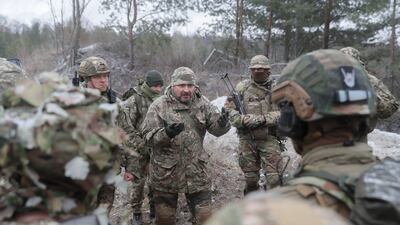Germany has expressed alarm as Russia continued its troop movements near Ukraine and threatened military action, despite an appeal from Berlin for de-escalation.
Annalena Baerbock, the German Foreign Minister, said she was “greatly concerned” about comments by Russian President Vladimir Putin that Moscow was prepared to take military steps in the conflict.
On Wednesday, Russia's Foreign Minister Sergey Lavrov said he expected negotiations with the US on Moscow's security demands to begin in January.
"It has been agreed that at the very beginning of next year, the first round should be bilateral contact between our negotiators and American ones," Mr Lavrov said.
But the US accused Russia of continuing to increase its troop build-up on the border with Ukraine.
Ms Baerbock said Mr Putin's remarks were followed by further military movements on the border, where Russia has amassed tens of thousands of troops in a move described by Nato as unexplained.
“We can only resolve this major crisis we are in through dialogue,” Ms Baerbock said.
The build-up has led to fears that Russia is planning to invade its former Soviet neighbour, although it denies such intentions.
German Chancellor Olaf Scholz had told Mr Putin on Tuesday of an urgent need for de-escalation, in his first call to the Kremlin since taking office.
Mr Scholz called for a resumption of four-power talks between Russia, Ukraine, France and Germany, known as the Normandy Group, aimed at mediating between Moscow and Kiev.
But Mr Putin, who blamed Ukraine for the stalemate in diplomacy, said in a speech on Tuesday that Russia was prepared to take military steps.

He told Defence Ministry officials that if the West continued its “obviously aggressive stance”, Russia would take “appropriate military-technical measures".
Russia “will react toughly to unfriendly steps", Mr Putin said.
Nato has said the military build-up shows no signs of slowing despite repeated warnings from G7 countries that Russia would face severe consequences for an invasion.
Western countries reject Mr Putin's assertion that Moscow is being provoked.
In Tuesday's call, Mr Scholz “expressed his concern in light of the current situation and spoke of the urgent need for de-escalation", his spokesman Steffen Hebestreit said.
Ms Baerbock said on Wednesday that Germany was ready for dialogue with Moscow, whether in the Normandy format or in talks between Russia and Nato.
“We need to talk, even if proposals have been made which are not our negotiating basis,” she said, referring to a series of Russian demands including a veto on Ukrainian membership of Nato.
Mr Putin used the call with Berlin to tout his proposals, aimed at preventing a Nato expansion into Russia’s sphere of influence.
He told Mr Scholz that the draft treaties circulated by Moscow would prevent the posting of weapons systems that threaten the world's largest country.
Russia’s proposed treaties include demands already rejected by Washington, such as a veto on Ukrainian membership of Nato.
“Nato’s relationship with Ukraine is a matter only for Ukraine and 30 Nato allies to determine,” said White House press secretary Jen Psaki.
G7 countries say Russia has turned down repeated requests to revive the Normandy talks. But the Kremlin’s version of the call blamed Ukraine for the stalemate, with Kiev accused of blocking the path to a new summit.
In a call with French President Emmanuel Macron, Mr Putin pointed the finger at Ukraine’s “unwillingness to honour the Minsk agreements”, a 2015 peace deal between the four Normandy powers.
Ukraine and Russia blame each other for flouting the agreement. Third-party observers have condemned the use of weapons banned under the accords.
Mr Macron’s office said he and Mr Putin had discussed the situation in the Donbas, the Ukrainian region at the centre of the separatist conflict.
Russia has been under sanctions since it annexed Crimea from Ukraine in 2014, a move not recognised by most of the international community.
Pentagon spokesman John Kirby said on Tuesday that Mr Putin’s intentions in Ukraine remained unclear.
“We continue to see a significant force presence near and around Ukraine border. It continues to be concerning,” Mr Kirby said.
The US said it would continue to send military equipment to Ukraine, a supply chain that has angered Moscow.
But Britain indicated last week that Nato troops would be unlikely to fight Russia on the ground because Ukraine is not part of the alliance.


